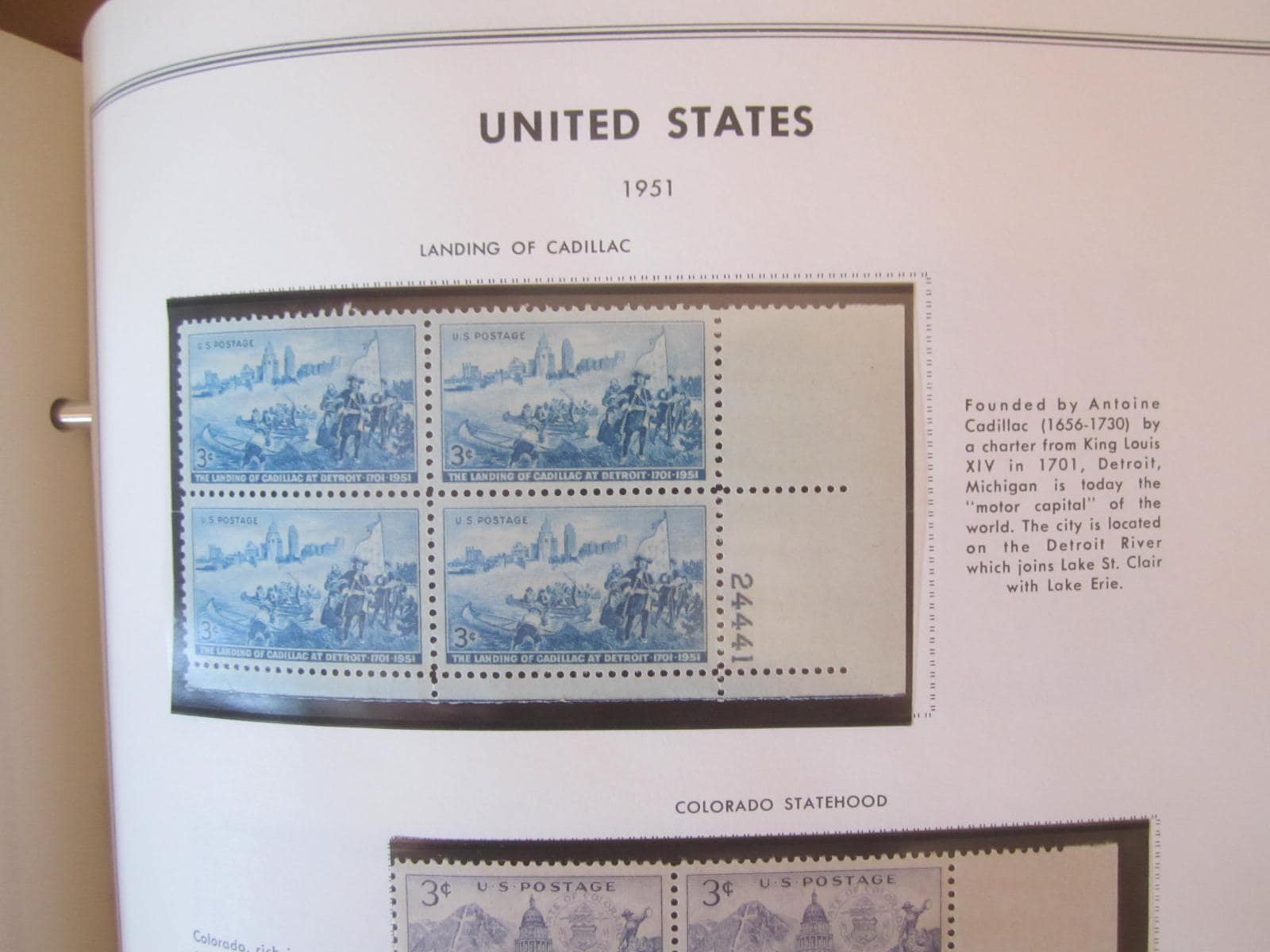Licking Stress
Sometimes, when the going gets rough, you just have to search for some way to get your mind off things. I have found that distractions are the best method to toggle the attention switch from stress to relax. An oasis seems to form in the desert around me.
One of my fondest childhood memories was collecting postage stamps with my Dad. I remember him taking me to the Post Office and the clerk at the window showing us all the new commemorative stamps. We would only buy a couple, but to me those precious stamps were like gold coins.
In those days stamps came on sheets and they had gum that you would lick on the back of them. Each stamp cost six cents. How many little boys, today, could you make happy with a quarter? For twenty five cents, my Dad could buy me four stamps and still have a penny left over. He would also have a very happy little boy.
These stamps were part of bigger sheets. In most cases, a sheet of stamps was really one fourth of a larger sheet of stamps. There was a plate number(s) on one corner of the sheet. Each color in the stamp was assigned a plate number. These numbers were called plate block numbers.
If you had one color in the stamp there would only be one plate number. Stamp collectors would try to collect these corners. If it was one color, and one plate number, you would get four stamps and the outside border. These were called plate blocks.
My Dad didn’t have much money, so it was a real treat when we were able to get a plate block. My Dad also found an old binder and we got some protective sheets so I could display my stamps. I could spend hours just looking at my collection.
One day my Dad took me to a stamp store. I was simply amazed with all the stamps I saw. I remember him buying me a stamp newspaper at the store. I took it home and spent hours roaming through the pages. It would tell you about the new stamps coming out and would give you all the details on the first day it was issued.
On the first day a stamp is issued there is a special ceremony for the stamp. Then, on that day only, the Postal Service strikes envelopes, with the new stamp on it, with a “First Day of Issue” cancellation. There are a few companies out there that design special envelopes and take them to these ceremonies. They then sell them to collectors as FDC (first day of issue covers) or cachets.
When I started earning a little money on my own I started collecting some of those FDCs. If you go to almost any one of my individual Presidential pages on this website, you will see some of the covers I have collected.
I found that, through my stamp collecting, I started reading the history of why they were issuing a stamp. Did you know that Cadillac founded Detroit? I learned that when I purchased a “The Landing of Cadillac at Detroit” stamp. In a very real sense, collecting stamps has poured fuel on my “interest in history” fire.
James Aloysius Farley was the son of Irish immigrants. He was young when his father died. After his father died he would help his Mom tend bars and run a grocery store she purchased. He would study bookkeeping and after he graduated from Packard School of Commerce he would go to work at the United States Gypsum Company.
Farley would actually meet our future President, a Democrat, when the future President was on the ticket for Vice President. In that election, the Democrats would go down to a crushing defeat. Farley would help his new friend get his revenge when this friend would defeat a sitting President.
Farley would help the new President in a totally different “official” way. For all the Presidential pressures, Farley would provide an outlet to help the President relieve some of his stress.
Our President came from a very rich family. Part of his family’s wealth came from the paternal side through New York Real Estate investments. That was teamed up with the maternal side that acquired much of its wealth from import trading. There was definitely no lack of money in this family.
When you are from a rich family you usually lack for nothing. Children get pawned off on nannies while the parents visit far off lands. His relationship with his parents was sometimes like that, at least as far as his father was concerned.
When he was around eight years old he developed an interest in postage stamps. His parents would get him started in the hobby. He got so involved in the hobby he would beg family members to send him mail so he could collect the stamps on the envelopes. When family members would go overseas he would beg them to bring back some foreign stamps.
He would end up having a huge collection. His collection wasn’t just one that sat around collecting dust. Even into adulthood, and even when he was President, he would spend hours looking at his stamps. He would especially use it as a way to relieve stress. He would go off into a room and pull out one of his binders and just escape the world through the visions of his stamps.
Not all the Bible is about “Bible stories.” Sure, there are the Adams, the Pauls, the Samsons, the Peters, the Ruths, and many more. There are also many lists of genealogy. There are directions on building a temple or even an ark. There are laws and rules. There are even stories of things to come.
But the Bible also has verse after verse of people’s thoughts. Jesus would tell parables. Solomon would share his wisdom. The Book of Psalms has several writers that expressed themselves in several different ways.
One of the greatest tools some of the writers of the Psalms probably employed was experience. That experience could possibly be either something they personally lived through or maybe it was something someone close to them lived through. These applications cause us to feel like these writers completely understood the same things we may go through.
I sometimes wonder about the experience some of these writers felt. Since these writings are somewhat generic, I wonder whether they were in the exact same situation I am in or are their situations just similar to what I am experiencing? It is with much liberty that I try to relate to one of the Psalms.
He is called “the stamp collecting president,” “perhaps the greatest friend of stamp collecting,” and an “avid philatelist.” A philatelist is one of those fancy names for someone who collects stamps. It is estimated that he had over 1.2 million stamps in his collection. He became a lifetime member of the American Philatelic Society. During his presidency, he either influenced or designed every commemorative stamp that was issued in the United States at that time.
When Franklin D. Roosevelt became President, he would name James Farley as the fifty-third Postmaster General. Roosevelt was so impressed by Farley’s campaign management skills that he felt it was the perfect fit. Being in the middle of the Depression, Farley would need those skills to keep the Post Office afloat.
Maybe this Bible character just had a very rough day at the office. The boss came in and told him that he was assigning him to some project. He understood the project was going to be a complete failure, but there was no telling this “all knowing” boss of its eventual failure.
He really didn’t want to have anything to do with the project. He knew the overseer’s joyful, bouncy attitude was just a cover up for his inexperience. He knew the wrong people were in the wrong places. He knew they were taking advantage of him because they had no one else who would put up with such chaos. He could see the future and the future was very dark.
His loyalty was without question, but this act seemed to bring him face to face with the fact that he wasn’t part of the “family,” he was just an employee. He was upset. He was so disappointed. He was hurt. He felt like he was kicked in the gut.
So what does a guy do when he feels that way? He could quit and find a job where they would better appreciate him and his talents. He could sulk. He could just do the minimum his job required. He could start a gossip chain to show how much of a victim he was.
No, our Bible character takes a different route. He takes a vacation, or a break, from his dire situation. He takes his beach chair and he goes and sits beside the lake. He looks over his shoulder and he notices the lush, green fields with the flowers swaying in the wind. The gentle breeze fills the air with the spices and meats being prepared for the dinner he will soon enjoy.
His heart fills with joy over the thought of all those who have given him trouble envying the pictures he will show them of his good time. Life’s dread seems to be lifting from him pretty quickly. A comfort blankets him. His soul feels restored.
He knows that he will have to return to work one day, but here, this day, he knows “those people” can never take this memory from him. He also knows, when things get really rough, he can slip off to a quiet place and think about this break, or he could just look at a souvenir he brought back, and experience peace. Even if it is just for a moment he knows his thoughts can go somewhere else.
In 1931 the Post Office revenue was $657 million. It plummeted to $588 million in 1932 and fell further and further in 1933 and 1934. Farley had a great deal of success because revenue started to rise in 1935 and after.
We were in the middle of the Depression and this presented many challenges for Farley. One of the biggest issues facing a business, or a government agency for that matter, was expenses. Perhaps the biggest expense in either of those is payment to employees. Farley wanted to control expenses, but he didn’t want to put a strain on employment. There were already too many people out of work.
The actual number of postal employees dropped from 254,956 in 1929 to 229,646 in 1934. Farley refused to cut jobs, but the he did not replace people who left for causes like retirement, death, resignation, or other normal causes. He also introduced payless furlough days, but those were suspended after 1934.
But Farley would become a very good friend of Franklin Roosevelt. As the Postmaster General, Farley and Roosevelt would spend hours together talking about and designing stamps.
President Roosevelt had many great issues he had to deal with. There was the Great Depression. There was World War II. There were countless other matters that demanded his time and attention. But FDR understood that it was not good for a mortal man to be constantly under stress. One of the ways he found to help him relieve his stress was to spend some time alone looking at his postage stamps.
The Lord is my shepherd; I shall not want. He maketh me to lie down in green pastures: he leadth me beside the still waters. He restoreth my soul: he leadeth me in the paths of righteousness for his name’s sake. Yea, though I walk through the valley of the shadow of death, I will fear no evil: for thou art with me; thy rod and thy staff they comfort me. Thou preparest a table before me in the presence of mine enemies: thou anointest my head with oil; my cup runneth over. Surely goodness and mercy shall follow me all the days of my life: and I will dwell in the house of the Lord for ever (Psalms 23, King James Version).
Life can get very tough at times. You may hate your job. You may have family problems. Someone may have betrayed you. You may be lonely and think no one cares. Sometimes the best thing you can do is take a break from it all.
It doesn’t have to be expensive to rest beside the still waters. Forget the worries and watch the birds. Don’t think about the deadline, open a book. Walk away from the drama and go to a show or a movie. Forget how bad everyone makes you feel and go to Chick-Fil-A (if you say, “thank you,” they are supposed to respond with: “My pleasure.”). And make sure you never pass up an opportunity to take a vacation.
Prayer: Dear Mighty Father, Thank You so much for those times You have made me lie down in the green pastures and where You had lead me to the still waters. Thanks for letting me know it is okay to need breaks from rough times and situations. Thank you for also teaching me that refreshing breaks really do help restore my soul. Amen.



